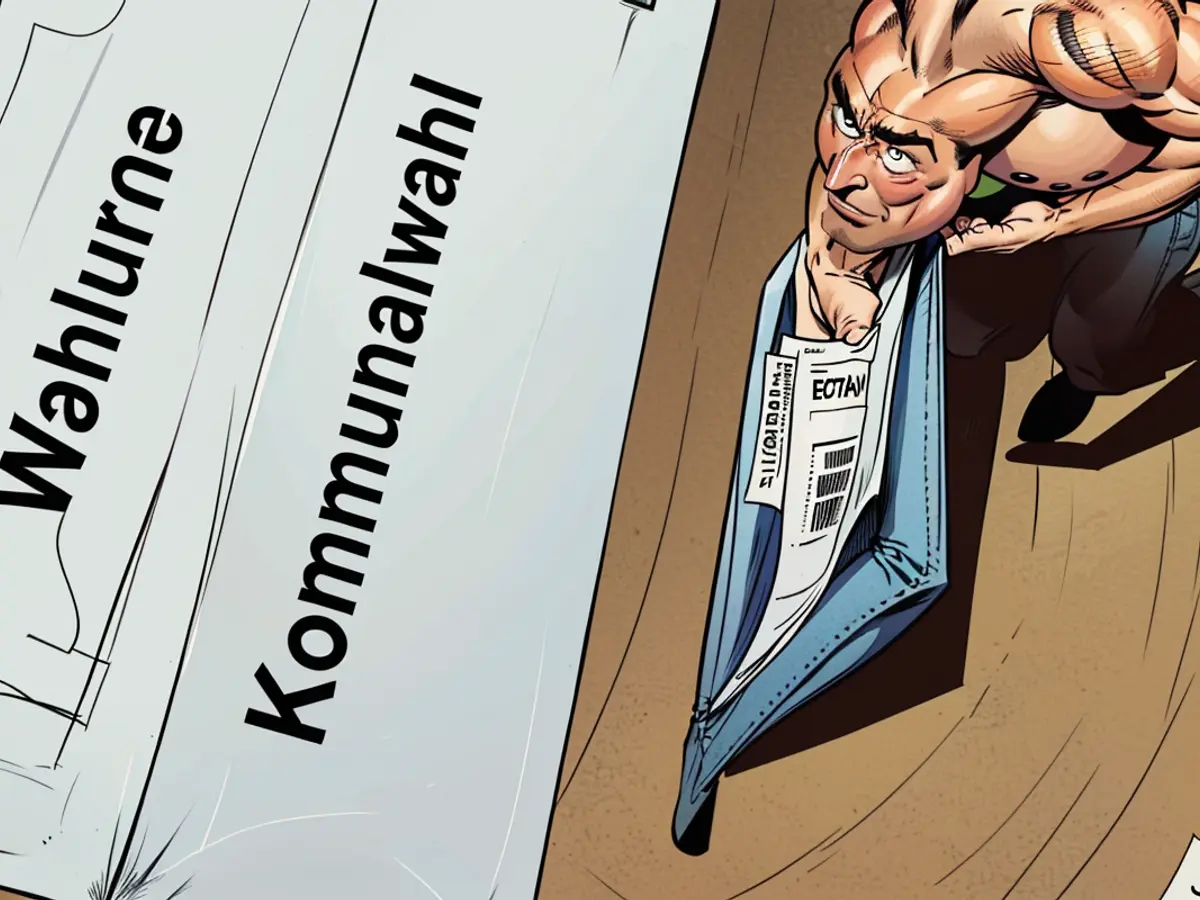Local Governments - The AfD is expected to win the European election in Brandenburg, with local elections imminent.
The Alternative for Germany (AfD) is likely to win big in the European elections in Brandenburg and will be much stronger than they were five years ago. According to estimates from 98% of the votes, the AfD obtained around 28% nationwide, followed by the Christian Democratic Union (CDU) with more than 18%. The Social Democrats (SPD) managed roughly 13% but trailed behind the new Left-wing Alliance (Left) which gained significantly more than 13%. Meanwhile, the Greens and the Left both experienced large losses, with the Greens losing over 6% and the Left reaching over 4%. The Free Democratic Party (FDP) was at around 3% and the Free Voters at over 2%. In the municipal elections, the AfD could potentially become the strongest force in Brandenburg for the first time. The anticipation for these elections was high, even though they were not directly comparable.
Majority for AfD in the municipal elections
After the tally of half the votes, the AfD gained close to 30% in the municipal elections. This would almost double their result from five years ago. The AfD was also the strongest force in all of Eastern Germany, according to an ARD report. The State Security Office regards the AfD state association as a suspected right-wing extremist organization. In the elections for 14 district councils and the city councils of the four free cities, the CDU came in almost at 19%, a drop from their 2019 win. The SPD secured about 15%, a decrease from previous years.
Solid gains by BVB/Free Voters and other voter associations were noted too. These groups took in more than 7%, as per the statements of the Brandenburg state election officer. The Left was at 7%, the Greens achieved less than 5%, and the FDP was under 3%. The Left Alliance (Left) did not run in the municipal elections under this name but participated locally with other alliances.
Around 2.1 million citizens were asked to vote in Brandenburg for the European election and the municipal elections on Sunday. Voter turnout was higher than in 2019.
AfD's success - SPD's lack of trust
Brandenburg's AfD chair René Springer sees his party on the right track. "I think this is a fantastic achievement considering all the anti-AfD campaigns since the start of the year," he told the German Press Agency (DPA) about the European elections. "We can't be stopped." He expects continued momentum for the state elections in the fall.
The SPD blames the losses in the European elections on a lack of trust in their federal party. "It shows that there is no trust in the federal SPD right now," said SPD General Secretary David Kolesnyk. The same trend that has affected the party federally has hit Brandenburg. The Greens also expressed disappointment. "We're obviously pretty disappointed with the outcome of the European elections," said the state chairwoman Hanna Große Holtrup.
The Brandenburg CDU views the results as a reminder for the traffic light parties. "The traffic light is also thrown out today in Brandenburg," said the state chair Jan Redmann. "The losses for the SPD and the Greens in the European elections in Brandenburg demonstrate: People are increasingly exasperated with the politics of the traffic light. They are pushing more and more people into the arms of the AfD."
In the 2019 European elections, the AfD led with 19.9%, ahead of the CDU (18.0%) and the SPD (17.2%). The Left and the Greens each gained 12.3%, while the FDP hit 4.4%. Other parties combined for 15.1%.
Five years ago, during the municipal elections, the CDU led nationwide with 18.3%, followed by the SPD (17.7%). The AfD grabbed 15.9%. The Left had 14.1%, the Greens had 11.1%, BVB/Free Voters achieved 6.3%, and the FDP had 4.9%.
Chancellor Olaf Scholz (SPD) from Potsdam cast his vote at the Chamber of Industry and Commerce voting station. Scholz was accompanied by his wife Britta Ernst. Foreign Minister Annalena Baerbock (Greens) had already voted by mail. Baerbock and Scholz represent the constituency of Potsdam in the Bundestag. Brandenburg's Minister President Dietmar Woidke voted at a polling station in Forst (Spree-Neiße district) in the Lower Lusatia region with his wife Susanne.
Read also:
- The interim result of the European election in Brandenburg indicates a likely victory for the AfD, with local elections approaching.
- The Left, led by Sahra Wagenknecht, gained significantly more than their 13% from five years ago in the European elections.
- The SPD, despite managing roughly 13% in the European elections, trailed behind The Left in Brandenburg.
- In the municipal elections, the SPD secured about 15%, a decrease from previous years, a trend that has affected them federally.
- The Free Voters, a voter association, gained over 2% in the European elections, according to the Brandenburg state election officer.
- The Alliance 90/The Greens experienced a large loss, with less than 5% in the European elections, a drop of over 6% compared to five years ago.
- The FDP gained around 3% in the European elections, a significant improvement since their 2019 results in Brandenburg.
- The CDU came in almost at 19% in the municipal elections, a drop from their 2019 win, despite being the strongest force in all of Eastern Germany, according to an ARD report.
- During the local elections, citizens in Potsdam and various municipalities across Brandenburg cast their votes.
- Chancellor Olaf Scholz and Foreign Minister Annalena Baerbock, both representatives of the Brandenburg constituency in the Bundestag, voted in the European elections.
- The AfD chair in Brandenburg, Rene Springer, is optimistic about the party's success in both the European elections and the upcoming state election.








